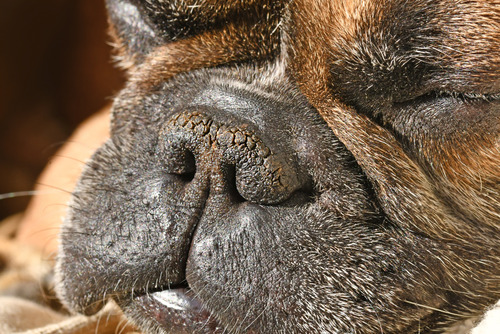A dog’s nose is often one of their most endearing features, and it’s usually wet and cool to the touch. But what does it mean when your dog’s nose is dry? As pet owners, we naturally worry about changes in our dogs’ health and behavior. A dry nose can have various causes, some of which are completely normal, while others may require attention from a veterinarian. In this article, we will explore the common reasons for a dry nose, when it might be a cause for concern, and what steps you can take to ensure your dog’s well-being.
Normal Reasons for a Dry Nose
Dogs’ noses can become dry for several benign reasons. Understanding these can help alleviate some of the worries you might have when noticing this change in your pet.
Sleeping
When dogs sleep, they aren’t licking their noses as frequently. As a result, their noses can become dry. This is perfectly normal, and you will likely notice that your dog’s nose returns to its usual moist state shortly after they wake up and resume their regular activities.
Weather and Environment
Environmental factors can also influence the moisture level of your dog’s nose. During the winter months, when indoor heating can dry out the air, you might find your dog’s nose becoming drier than usual. Similarly, exposure to the sun or wind can cause temporary dryness. In these cases, providing a humidifier in your home or limiting prolonged exposure to harsh weather can help.
Dehydration
Just like humans, dogs can become dehydrated. A dry nose can be a minor sign that your dog needs more water. Ensure your dog has access to fresh water at all times and encourage them to drink, especially during hot weather or after physical activity.
Health Concerns Associated with a Dry Nose
While a dry nose is often harmless, there are instances where it can indicate an underlying health issue. Being aware of these conditions can help you decide when to seek veterinary care.
Allergies
Dogs can suffer from allergies just like humans. Allergies to certain foods, environmental elements like pollen, or even household products can cause your dog’s nose to become dry and irritated. If you suspect allergies, it’s essential to consult your veterinarian for proper diagnosis and treatment options.
Autoimmune Diseases
Certain autoimmune diseases, such as pemphigus, can affect the skin around a dog’s nose, leading to dryness, cracking, and sores. This condition requires medical attention and specific treatment plans from your vet to manage effectively.
Hyperkeratosis
Hyperkeratosis is a condition where the skin on a dog’s nose becomes thick and dry due to an overproduction of keratin. This can make the nose appear crusty and hard. It’s important to address this with your vet, as they can recommend appropriate treatments to soften and manage the condition.
When to Contact a Veterinarian
Determining when a dry nose is a sign of a problem can be challenging. However, there are specific symptoms and situations where veterinary advice is necessary.
Persistent Dryness
If your dog’s nose remains dry for an extended period, despite normal activities and hydration, it could indicate an underlying health issue that requires a vet’s evaluation. Persistent dryness should not be ignored.
Accompanying Symptoms
A dry nose accompanied by other symptoms such as lethargy, loss of appetite, vomiting, diarrhea, or changes in behavior warrants immediate veterinary attention. These could be signs of a more serious condition that needs prompt diagnosis and treatment.
Cracks and Bleeding
If your dog’s nose is not only dry but also shows signs of cracking, bleeding, or sores, it’s important to seek veterinary care. These symptoms can be painful for your pet and may indicate an infection or other health issues that need to be addressed.
Caring for Your Dog’s Nose
Maintaining the health of your dog’s nose involves simple yet effective practices. Here are some tips to keep their nose in good condition.
- Hydration and Nutrition: Ensure your dog has access to plenty of fresh water and is consuming a balanced diet. Proper hydration and nutrition play a vital role in the overall health of your pet, including the condition of their nose.
- Environment Control: Monitor the environment your dog is in. Use a humidifier during dry winter months, and avoid exposing your dog to harsh weather conditions for prolonged periods. Additionally, consider hypoallergenic products if your dog is prone to allergies.
- Regular Vet Visits: Regular check-ups with your veterinarian are crucial. Routine exams can help catch any potential health issues early, including those that might cause a dry nose. Your vet can provide personalized advice and treatments if needed.
Managing Your Dog’s Nose Health
A dry nose in dogs can be caused by various factors, ranging from normal environmental conditions to more serious health concerns. Understanding these causes and knowing when to seek veterinary care can help ensure your dog remains healthy and comfortable. If you ever have concerns about your dog’s nose or overall health, please contact us at World of Animals Veterinary Hospital to schedule an appointment. Our team is here to provide the care and support your pet needs.





